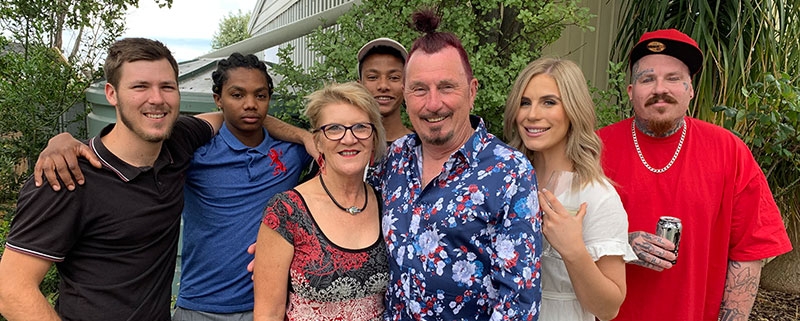by Lisa McIntosh
What makes a group of individuals a family? Being related by blood or marriage? How about definition 7 in the Macquarie Dictionary: ‘a group of persons who form a household and who regard themselves as having familial ties’?
Is our understanding of family more to do with shared lives and values than being ‘descended from a common progenitor’, as definition 4 states? Jesus certainly takes a more inclusive view of family, as we are reminded in this month’s Bible study (see John 19:26,27 and Matthew 12:49,50).
TJ Krause was almost four when he and his younger brother Abebaw (AJ) came from an orphanage in Ethiopia to become part of a new family in Australia.
Now 20 and an apprentice carpenter, he still remembers the feeling he had meeting his new mum, Julie, for the first time and, ultimately, his new siblings and, later, his new dad, Jonathan. Each of his parents also has children from previous marriages.
‘It was really exciting, and it was rather interesting and bizarre and surreal’, TJ says of the experience of meeting and joining a new family, who now live at Maslin Beach in South Australia. ‘We don’t call it “blended” but it is a blended family.’ He says that even though there are particular challenges to being part of a family in which members come from different backgrounds, the best element is that ‘there’s no judgement whatsoever’.
‘We all make it work really well, and Mum and Dad are just super accepting. When you’re younger and you don’t know where your real parents are, sometimes you question that.
‘But you do realise that the parents you have really do love you and they cherish you and protect you. That makes you realise that they are your real parents even though they’re not blood.
‘I think family keeps you motivated to keep pursuing life because you’re showing them that you’re grateful for the opportunities they’re giving you. A family’s always there to love you, support you, be there for you through thick and thin, and there’s nothing that can beat unconditional love.
‘If someone’s willing to support someone else throughout every single thing and be there for them through the good and bad, that’s the definition of family, whether it’s your brother or it’s your best mate.’
Blending two families and households into one challenges parents, too, with things such as setting disciplinary boundaries, territorial feelings and behaviour, different parenting styles and basic practical issues all requiring attention.
Pastor Mark and Beth Kaesler, of Seaford in South Australia, merged two households into one when they were married. Between them, they had four children from their previous marriages, including two sons named Paul!
‘It’s a funny thing when you join two families and two houses’, Beth says. ‘You don’t mean to be, but you’re quite threatened about trying to maintain territory. When Mark, Elisa and Paul moved in, there was all this sorting about what we would throw out and what we’d keep. You know, like, whose egg flip will we keep? It was very, very territorial.
‘When you get past that physical territorial stuff, then you have to move on to the emotional territorial stuff and spiritual territorial stuff. You know, like, I’ll give a bit here and you give a bit. And I think we learned fairly early that we both had to give a lot more than 50 per cent to make it work.’
Both Beth and Pastor Mark say that God’s support was critical in blending their families.
‘God is part of everything, really’, Pastor Mark says. ‘God is never absent. He is speaking to us in all sorts of ways. And I guess you really can’t put a value on all those little bits of knowledge that he gives you in this journey.’
‘I think it starts with a sense and an understanding of how much God has given you and how much God has forgiven you’, Beth adds. ‘That gives you a huge sense of God’s grace which you can then give out.’
And they agree that God is the one in their family who can best break down the barriers that members may put up for their own feeling of safety and security.
God is also central to the family life of Pastor Colin Simpkin, his wife Tanya, son Brad and niece Abbie Williams, of Grovedale in Victoria. Abbie became part of the family household after the death of her mother, Joanne, Tanya’s sister, as her father is not able to look after her.
The Simpkins say they always wanted two children and believe that God had plans for them to be ‘a complete family with Abbie’.
‘With Brad being an only child, Abbie coming into our family brought him a sibling and he learnt how to share everything – toys, home and parents’, Pastor Colin says. ‘As a family, we miss one another when any are away. We have the joy of seeing the accomplishments of the others. We have brought God into Abbie’s life and we learn a lot from her, too.
‘Having all of the members of our family now has added extra love into each of our lives. Abbie loves having a female role model and support person, and Tan is what Abbie needs to guide her through many difficult areas.’
Pastor Colin says that while there were challenges for each of them in getting used to the new family dynamics, the family unit is really important to them ‘because God put us together’.
‘Everybody needs to know they belong somewhere and that they matter to others. God is love and we know his love through Jesus, who calls us to pass that love on to our families.’
You can read more of Beth and Mark’s story, or listen to their Messages of Hope interview at www.messagesofhope.org.au/blended-families/



